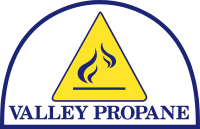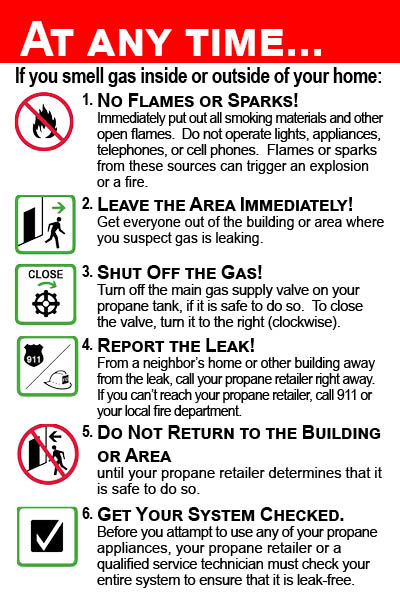Propane, also known as liquefied petroleum gas (LP-gas), is one of the nation’s most versatile sources of energy. This safe fuel serves approximately 60 million people in the United States in millions of homes, industry, farming and more.
More than 14 million families use propane to fuel their furnaces, water heaters, air conditioners, outdoor grills, fire places, dryers and range tops.
Propane is flammable when mixed with air (oxygen) and can be ignited by many sources, including open flames, smoking materials, electrical sparks, and static electricity. Propane has always been a “green” fuel, far ahead of today’s trend. Propane is used on more than 660,000 farms for irrigation pumps, grain dryers, standby generators and other farm equipment. It is an essential fuel for crop drying, flame cultivation, fruit ripening, space and water heating and food refrigeration.
Propane vapors are heavier than air. For this reason, they may accumulate in low-lying areas such as basements, crawl spaces, and ditches, or along floors. However, air currents can sometimes carry propane vapors elsewhere within a building.
Propane is easy to transport and used in areas beyond natural gas mains. Because it is 270 times more compact as a liquid than as a gas, it is economical to store and transport as a liquid. The liquid propane is turned into a gas inside a tank or a cylinder. In its natural form, propane is colorless and odorless. To make propane easier to detect in the event of a leak or spill, manufacturers deliberately add a chemical compound to give it a distinctive smell.
For further information, click the arrows on the tabs below to learn more about each topic.
How to Recognize the Smell of Propane?
Propane has a strong, unpleasant smell like rotten eggs. Propane manufacturers add the smell deliberately to help alert customers to propane leaks, which can create a safety hazard.
It may be hard for some people to smell propane for the following reasons:
- They have a cold, allergies, sinus congestion, or another medical condition.
- Their sense of smell is reduced due to use of tobacco, alcohol, or drugs.
- Tobacco smoke, cooking odors, and other strong odors can mask the smell of propane.
- As people age, their sense of smell can become less sensitive.
If the smell of propane is present in the air over a period of time, “odor fatigue” can occur. The nose “gets tired,” and a person no longer smells the propane odor. The propane smell may not be strong enough to wake up someone who is sleeping. The propane smell may be in a location (basement or attic) where it is not detected by people in other areas of the building. A phenomenon called “odor loss” can occur-an unintended reduction in the concentration of the odor of propane.
What Should I Do If I Smell Gas?
- NO FLAMES OR SPARKS! Immediately put out all smoking materials and other open flames. Do not operate lights, appliances, telephones, or cell phones. Flames or sparks from these sources can trigger an explosion or a fire.
- LEAVE THE AREA IMMEDIATELY! Get everyone out of the building or area where you suspect gas is leaking.
- SHUT OFF THE GAS. Turn off the main gas supply valve on your propane tank, if it is safe to do so. To close the valve, turn it to the right (clockwise).
- REPORT THE LEAK. From a neighbor’s home or other building away from the gas leak, call your propane retailer right away. If you can’t reach your propane retailer, call 911 or your local fire department.
- DO NOT RETURN TO THE BUILDING OR AREA until your propane retailer determines that it is safe to do so.
- GET YOUR SYSTEM CHECKED. Before you attempt to use any of your propane appliances, your propane retailer or a qualified service technician must check your entire system to ensure that it is leak-free.
Vapors from flammable products such as gasoline, kerosene, paint thinner, and solvents, can be ignited accidentally by the pilot light of a propane appliance. Flammable vapors are often heavier than air and may travel along the ground and collect in low or confined areas (such as a basement or pit). Sometimes the vapors may follow air currents in the building to higher levels. Any source of ignition in these areas (such as a pilot light, spark, heater element, or electric motor) could cause an explosion or a fire.
TO HELP REDUCE THE RISK OF FLAMMABLE VAPOR IGNITION:
- Store flammable liquids in well-sealed containers outside.
- Do not use gasoline, cleaning fluids, oil-soaked rags, or other flammable liquids inside a building where propane appliances are located.
- PROPANE VAPORS CAN BE DANGEROUS. Propane vapor is also combustible and can ignite explosively. Keep propane storage containers closed. Never store propane cylinders in an enclosed area, or near a heat or ignition source.
What Is Odor Loss?
ODOR LOSS ALSO CAN DIMINISH PROPANE’S SMELL.
On rare occasions, propane can lose its odor. Several things can cause this including:
- Air, water, or rust in a propane tank or cylinder can reduce propane odor concentration.
- If the propane is leaking underground, its passage through soil may reduce the smell of propane.
- The propane odor may stick to the inside surfaces of gas piping and distribution systems and possibly other materials.
Since there is a possibility of odor loss or problems with your sense of smell, you should respond immediately to even a faint odor of gas.
IF YOU ARE CONCERNED that you or others in your home may have difficulty smelling propane, consider buying one or more propane gas detectors.

